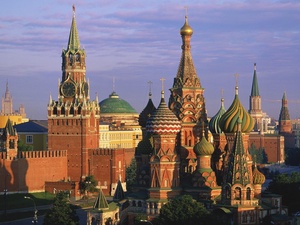As the Russia ponders a future of warming temperatures throughout the Arctic and much of Siberia, the Kremlin has adopted an approach that is novel among the world’s governments: If you can’t beat climate change, join it.
As the Russia ponders a future of warming temperatures throughout the Arctic and much of Siberia, the Kremlin has adopted an approach that is novel among the world’s governments: If you can’t beat climate change, join it.
Recent reports in the Russian media, as well as public studies and documents published by government ministries and science services suggest Moscow – rather than embracing alternative energies or working to slash carbon emissions – is looking at ways to take global warming in stride, if not profit from it.
Nowhere is this strategy more apparent than in the Russian Arctic, where Moscow sees an economic boom on the horizon, ushered in by rising temperatures and melting ice.
According to data from Rosgidromet, the Russian national weather service, temperatures throughout the country in 2018 were 1 to 2 degrees above normal. In the polar region, those temperatures were even higher – some 2 to 4 degrees above normal, according to the agency. Meanwhile, the volume of the Arctic’s oldest and thickest ice has decreased by an astonishing 95 percent, says a study from the National Oceanic and Atmospheric Administration’s in the United States.
The news for the rest of the world is just as bad. In its most recent devastating report, the Intergovernmental Panel on Climate Change envisions a world of fires, floods, food shortages, major storms of increased intensity and global temperature spikes of 1.5 degrees Celsius by 2040.
But Russia is embracing the warmth. President Vladimir Putin has long been on record both questioning that humans are responsible for climate change, and asserting that global warming is part of a natural cycle that would benefit the Russian economy.
He also once famously declared that climate change would mean Russians would save money on fur coat and boost the wheat harvest in Siberia. That statement, in 2016, sparked an investment boom in Russian farmland as Moscow’s financial class placed bets on thawing permafrost yielding arable land.
 The Yamal LNG project.
Credit: Anna Kireeva/Bellona
The Yamal LNG project.
Credit: Anna Kireeva/Bellona
Russian industry is following the lead. Just before Christmas, the Yamal LNG project – a $27 billion natural gas effort above the Arctic Circle – reached full capacity, thanks in large part to speculation that warming temperatures will ease polar hydrocarbon shipments from the icy roof of the world.
Rosatom, Russia’s nuclear energy corporation, now has oversight of the Northern Sea Route – the 6,000 kilometer East-West Arctic sea corridor – which heralds a build-out of far northern ports and other key infrastructure on the backs of an expanding nuclear icebreaker fleet.
And last year Putin not so much hoped as ordered that cargo traffic being shipped through the Arctic increase to 80 million tons a year – a fourfold hike over currently levels – in a bid to turn the Northern Sea Route into a polar rival to the Suez Canal. International shippers have begun to test the waters. Last summer, Danish shipper Maersk, sent a container ship from Busan, Korea to St. Petersburg by way of the arctic.
But Russia’s hands-off approach to the dangers of climate change isn’t doing the rest of the world any good. At December’s climate summit in Poland, at which the UN hoped to finalize national commitments to the Paris Climate Accord, Russia joined climate-skeptic nations like the United States, Poland and Saudi Arabia in an effort to water down the gathering’s final statement. Rather than sign on to language that would have “welcomed” the IPCC report, Russia and its allies preferred for it only to be “noted.”
Moscow’s reluctance to grapple with climate change could have disastrous effects. According to a study published last month by the science journal Nature, Russia’s current climate policies would push up global temperatures by more than 5 degrees Celsius — at least 3 degrees higher than the limit climate scientists are aiming for.
Still, the path of ignoring climate change in favor of reaping more wheat and turning the Arctic into a shipping superhighway is having local consequences. Last summer, wildfires engulfing Siberia were the biggest seen since 2008, their smoke reaching all the way across the Pacific. Deadly floods washed across the southern Krasnodar region, which hosted the 2014 Winter Olympics, when October storms brought several months worth of rain in just a few days. In March thousands of people were evacuated in Siberia’s Altai region after snowcaps that don’t usually melt did.
And while Moscow bankers might be betting on future farmland as the Tundra melts, the country’s current farmland is getting battered by droughts.
So will Moscow’s apparent policy of embracing climate change pay off? That remains to be seen. At the very least, Moscow’s politicians will be saving money on fur coats.





